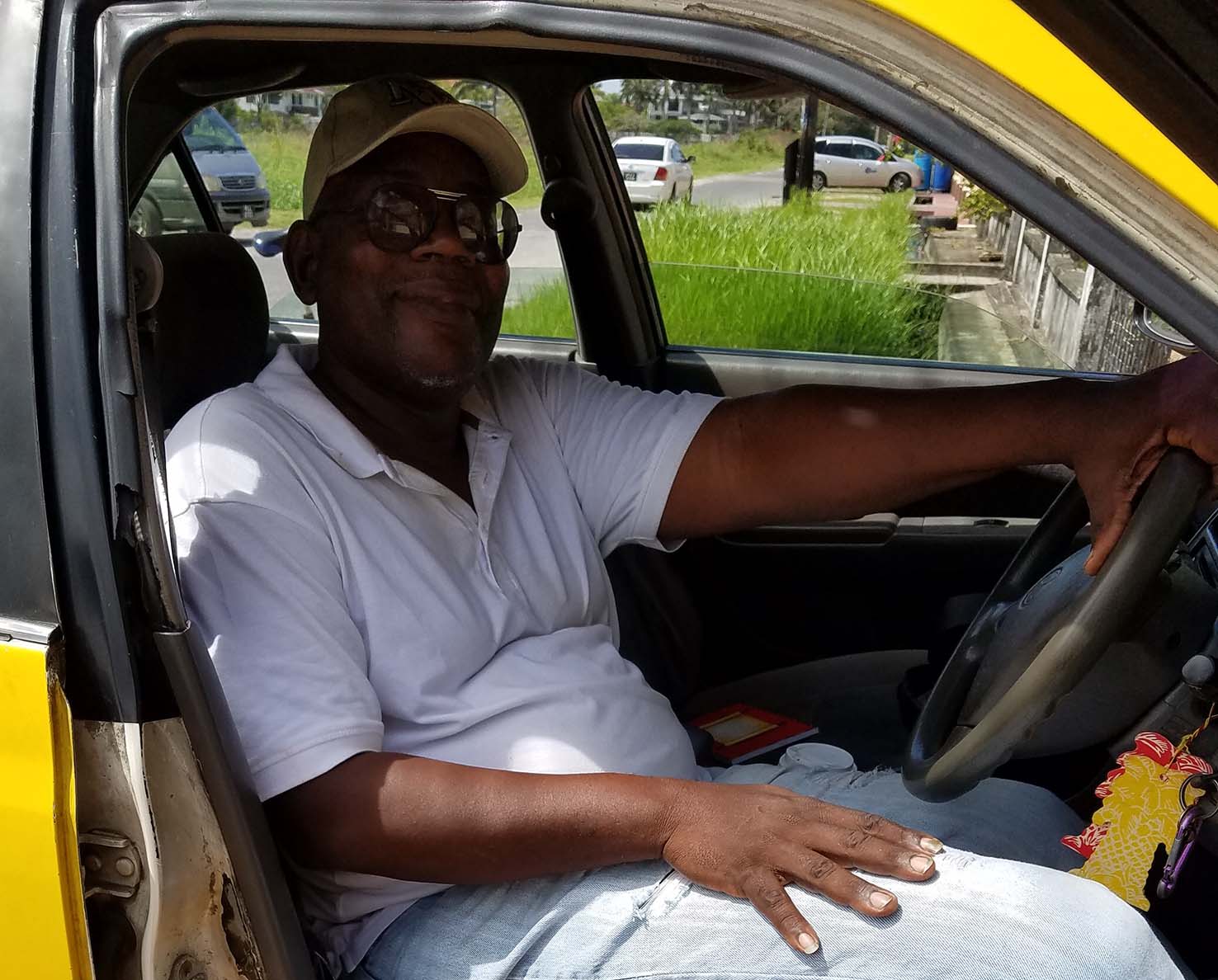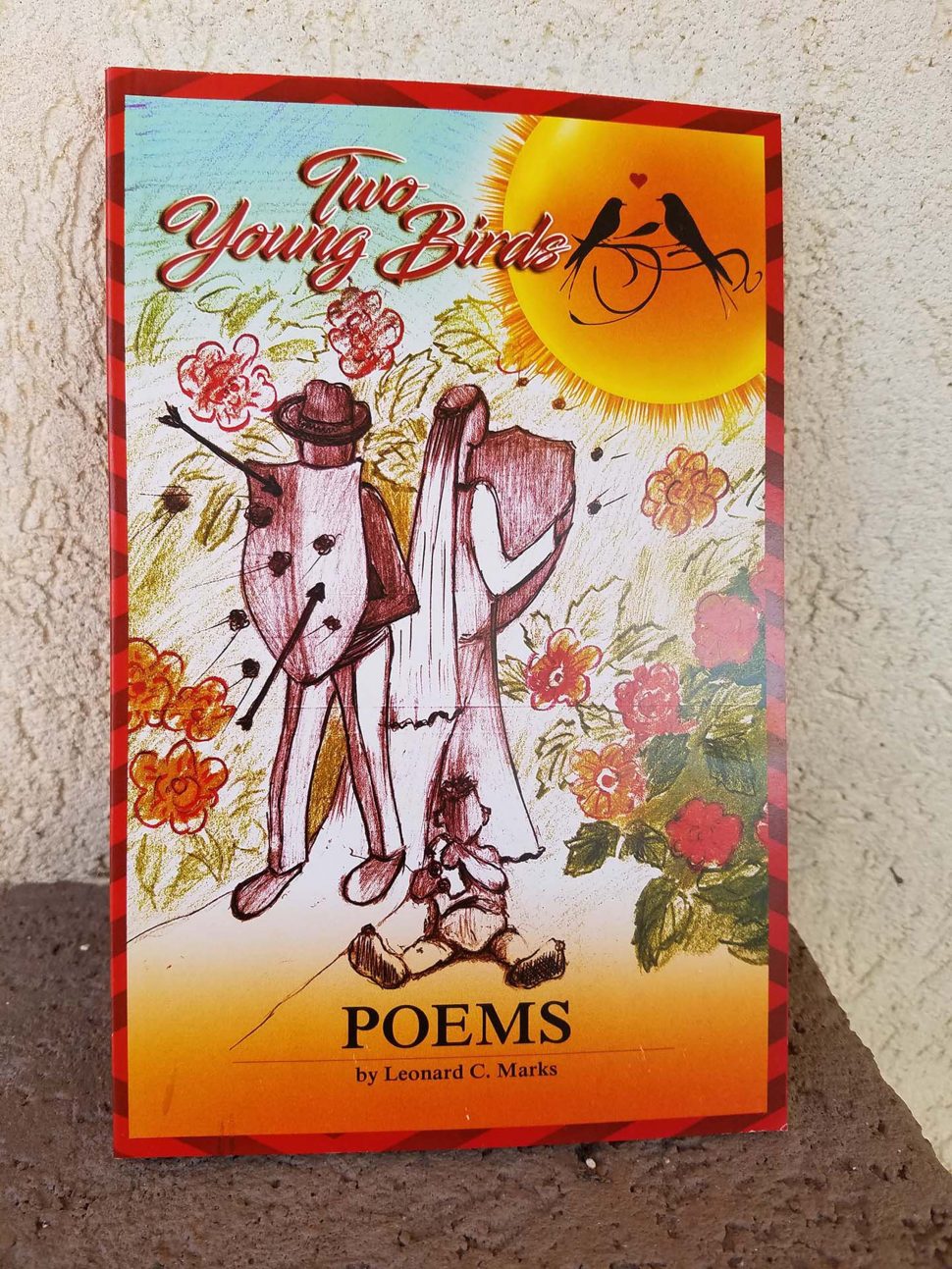Leonard Marks is the perfect example of not allowing a tragedy to define one’s future. Losing his wife and a leg following a traffic incident saw him forced to change course and though faced with further hardships he persevered and attained his new dream of becoming an author.
With one published book and two almost completed, Marks has put years into informing, edifying and changing life directions. His published book of poetry titled Two Young Birds, focuses on love, courtship and marriage. One of the two almost completed books will assist children in coping with studies and school and the other, a second book of poetry, speaks to Guyana’s diverse and rich history.
But 28 years ago, he was a University of Guyana final year student in electrical engineering and being an author was not on Marks’s radar. Everything changed on December 15, 1990 in the vicinity of the Demerara Harbour Bridge when a truck slammed into the motorcycle he was riding and on which his wife was pillion rider.

The accident saw the death of the woman he describes as an “angel.”
“She was an exceptionally good person. Guyana lost an angel…,” was how he described her to the Sunday Stabroek.
They had been married for just under two years, but he said the time they spent together “was exceptional.”
Asked if he still thought of her after so many years, Marks was quick to respond: “Oh yes. All the time. She was a very disciplined person, a very committed Christian, she gave a hundred percent to everything that she did. And I am not just saying this because it was my wife, all her friends who knew her, knew that she was a very hardworking individual and they know that society would have lost a very valuable person.”
At the time of the crash, they had been on their way to a wake for her uncle.
The accident happened close to the bridge when a company truck “slammed into us [and] she and another pedestrian died on the spot.”
Marks recalled that he was flung from the motorcycle across a trench along with his wife who died on the fence. When he saw her, her back was to him which he now says was fortunate because he was told her face was disfigured. He knew she was gone and at that point he started to use what he described as his “own psychological therapy on myself” warning himself not to grieve, not to cry and he believes the fortitude came from God whom he called upon.
He was eventually picked up and was taken to the hospital with multiple injuries, inclusive of a broken leg.
Initially taken to the West Demerara Regional Hospital, Marks said he was “literally discarded on the steps of the hospital because the doctor refused to look at me, saying he can’t do anything.” Fortunately, two men, whom he knew casually, entered the hospital compound and heard the doctor’s comments and they took him to the Georgetown Public Hospital in a car.
“The two guys said look they would have none of it and they took me up in a hire car and brought me to Georgetown Hospital at a time when the nurses were on strike and so I was attended to by a doctor and student who was fitting in,” he said.
But his woes in accessing treatment were not over, as he recalled when he was taken to the theatre, he had to await the arrival of the surgeon, who had to be called out. According to him, “he didn’t do too much of a good job because he left a lot of debris in the wound on the leg which became infected.”
In unbearable pain, he was eventually transferred to a private hospital where a doctor thought he had the “wherewithal to bring about full healing.” But one year later, he was in the same position and a specialist who viewed his x-rays decided keeping the leg would serve no purpose.
“[He] said it is better to take it off and I would get on with normal life [and] so with his assurance I proceeded to do same and here I am today alive and well and functional.”
As for his survival, Marks described it as a miracle since he pointed out both he and his wife were on the motorcycle and they were separated by the bumper of a truck.
“After going into the theatre 12 times and literally hundreds of injections I survived…,” he said.
Absorbing information
Turning to his journey to becoming an author, Marks said he spent almost all of his life absorbing information, including scientific, from society and from the outer world through reading and television.
Asked how he actually made the decision to write, he answered: “It was a matter of careful consideration after I was in hospital for over one year…”
It was lying in the hospital bed after eight months and contemplating what would have become of his life that the decision was made. By that time, he knew he was about to lose his leg. Marks said he had to consider what he would have done with the knowledge he would have gathered over the years. He also had the big question of survival without a leg.
“After careful consideration of various options, including getting back into the field of engineering, making music to convey the information that I had, I realised that all the other options would entail having lots of money from the start and writing was probably the best because I could have written as much as I wished without being hindered.” He noted that the issue of sourcing of finances would have only come into play after he would have written.
Speaking specifically to writing poetry, Marks recalled one morning in hospital after hearing people talking some words came to his mind and he wrote them down. But after that initial poem on gossiping he started to write children’s poems which focused on guiding them on the dos and don’ts in life.
“I started on that note and it grew from there…,” he said adding that it was from there that Two Young Birds grew.
The book focuses on love, courtship and marriage and it takes the reader “sequentially through all the good times and bad times.” There are also some educational, motivational and inspirational pieces in the book.
“It is really a wholesome package that can be very inspiring and encouraging. It has poems with a lot of excitement, poems that are more sober, gentle etcetera. But it is good for all the young people, the young and those who are young at heart, it is good for those who is embarking on courtship as it would help to fortify them with the right kinds of thoughts,” he said.
He also believes that the book would answer questions young love birds might have and clarify doubts they might have, married couples can also find the book useful as the author believes it would help them to see a different perspective on love, their partners and the meaning of life.
‘Life is lived once’
Even though he faced tragedy, Marks said he knew that life is only lived once and unless he wanted to leave the earth not accomplishing anything, he had to find it in himself to plod on.
It was not just writing that he worked at, but he also once owned an electrical business, taught Mathematics at various institutions and gave private Physics lessons. He finally found another legal occupation, which he did not name, but which gave him more time to focus on his writing.
He has since completed a book for students: Basic Study Skills which he believes is needed by all student as it is about the science of managing one’s student life and studies. He has already approached the Ministry of Education to have the book integrated into the school’s curriculum as he believes it is a very essential tool since study skills are fundamental to all students. Marks, himself a father of two, said he believes the book will also help to create a better environment in homes where parents do not understand the rigors of their children’s school and study life.
Marks is also about to complete another book of poems and he expects this to be published this year. This book deals with national issues and life in general in Guyana inclusive of politics, the law, racism and some historical information on slavery.
He is currently trying to source funding as he said he would need some assistance to market and distribute his books.
“I feel happy that I am able to contribute the solution to some of the problems that we as Guyanese are facing…,” he said of his writing.
As to his advice to persons who are faced with disabilities, especially those who become disabled after adulthood, Marks said acceptance begins with self-searching and while persons may think less of you and ridicule you, there is still that inner strength to tap into.
“As long as there is life there is hope. So, stage one, examine yourself to see what ability you have, what talent you have and what you can do… and do the necessary reading and research and talk to people who can enhance your talent and take it from there,” he advised.






